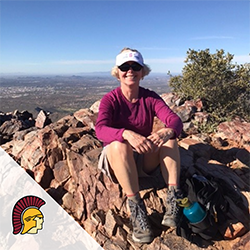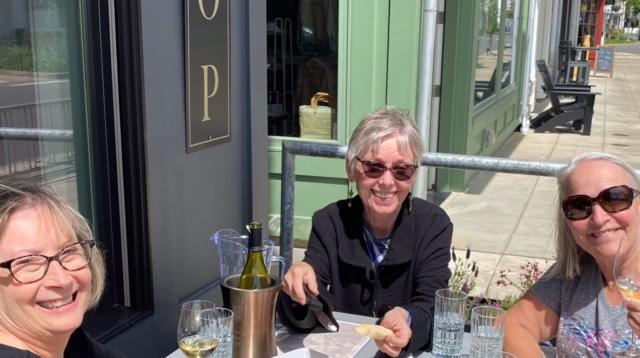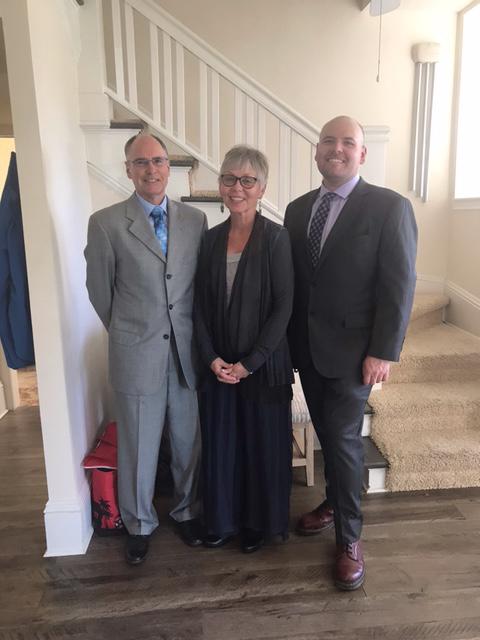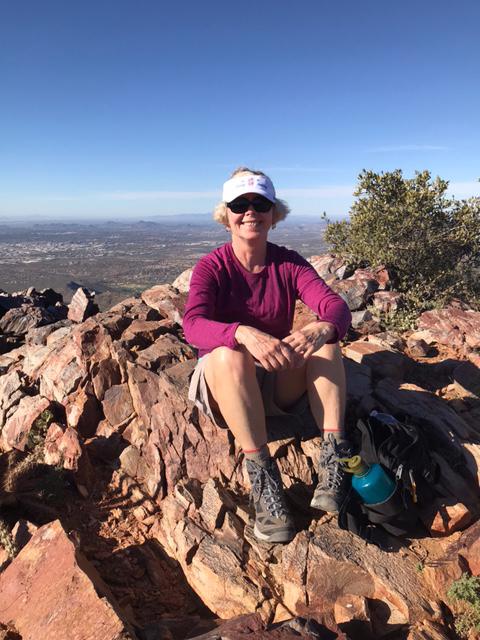

What can happen in a span of 50 years? Some may graduate from college, start a new career, make memories with family and friends, explore new places, make an impact on the world, and even retire. It has been 50 years since Roberta “Bobbie” Wilkens-Bischoff 1972 graduated from the University of Minnesota Technical College with her associate in arts and associate in applied sciences degrees in medical secretarial administration, and these were the perfect stepping stones to her career path. She observed many changes in the world, from attending college during the Vietnam conflict, working on the frontlines of the AIDS crisis, and now experiencing the COVID-19 pandemic. Through it all, her emphasis on kindness and empathy has been a large part of the way she approached and continues to live her everyday life.
Wilkens-Bischoff is a Crookston Minn., native, and, after briefly attending a junior college in Rochester, Minn., she made her way back to her hometown to begin her studies at the University of Minnesota Technical College. Even though she lived in the area, she moved into the residence halls to experience all the school had to offer. “It was a fun place to go to college,” Wilkens-Bischoff recalled. In Skyberg Hall, she had two roommates from Minnesota, and friendships were developed including with students who fought in the Vietnam conflict. Because the early 1970s marked a fearful time in the United States as the war progressed, the students clung to these important friendships for support. “We were all kind of struggling to figure out what we were going to do when we grew up,” Wilkens-Bischoff explained. Having close friends nearby eased the fear of entering adulthood in an unpredictable world.
The Trojan Inn was the stomping ground for Wilkens-Bischoff and her friends and a place where card games and between-class conversations occurred. It was a popular spot for both students to spend their free time and faculty to enjoy their morning coffee. In the winter during hockey season, the hotel management students served dinners at the Trojan Inn for the public. One evening, an important hockey match was broadcasted over the radio to students working in the kitchen. Any time there was an update, they relayed the action to the interested students and the public enjoying their meals. “We had so much fun! Those were the days!” she exclaimed.
On campus, the support students showed each other also extended to faculty. Wilkens-Bischoff took many classes throughout her time at the college that expanded her understanding of familiar topics while also introducing her to entirely new topics for the first time. In a small machines class, she was tasked with taking apart and reassembling a lawn mower. She confidently approached the assignment, but, after securing what was thought to be the final piece on the machine, she realized there were a few extra pieces left. Instead of making the students feel bad for any misunderstandings, the professors joked with and guided them to success.“You never felt put down because you didn’t get it,” she expressed. Because of their warm and welcoming presence in the classroom and beyond, the faculty members were role models to their students. One faculty member in particular, Betty Brecto, was an instructor Wilkens-Bischoff respected. Ms. Brecto was one of the few women working on campus at the time, and now, as Wilkens-Bischoff looks back, she admires her strong nature and the environment in which she taught.
With all the memories from her classes and the relationships she created, Wilkens-Bischoff said goodbye to her student life at Crookston in 1972 for the time being. She did not leave the university right away, however, as she was first employed as a receptionist in the Provost’s office on campus. Her interest in medicine later guided her to the Twin Cities campus where she worked in a medical office. The busy Minneapolis area was full of many job opportunities for Wilkens-Bischoff in the health care field, an area of interest she developed early on in her life. After her position at the University of Minnesota Twin Cities, she worked at a doctor’s office with four internists. Although this position was a new challenge for her as it was a smaller environment than she was used to, she thoroughly enjoyed getting to know the regular patients visiting the office.
Returning to her hometown, Wilkens-Bischoff re-enrolled in the University of Minnesota Technical College in 1976. In her new field of study, horticulture, she was introduced to Roger Wagner, head of the horticulture department. She remembers him being an excellent faculty member whose devotion to the study of horticulture strongly impacted his students. For one of his classes, the students took a field trip to various Minneapolis plant nurseries to receive a first-hand look at the way these businesses operated. In addition, Wilkens-Bischoff worked at three different departments around the college. Wilkens-Bischoff’s time in Crookston finally came to an end in 1978 when she moved to Lansing, Mich., for a few years. However, there was one unfulfilled dream that loomed in her mind during this time: nursing school.
Her decision to study nursing brought her back to Minneapolis, a familiar place from her past. St. Mary’s Junior College was conveniently located a few blocks from where she lived years prior making it easy for her to navigate a new school. At this college, Wilkens-Bischoff took nursing courses while also working on campus. Once she received her registered nurse (RN) license, she moved to Tacoma, Wash., and began an internship in critical care. This new state won her heart, and she has lived much of her life there since 1984.
Working as an RN was rewarding for Wilkens-Bischoff as she was able to assist those in need in many capacities. She was a member of the Washington State Nurses Association and the Pierce County Nurses Association. These groups work to provide scholarship funds to aspiring nurses in the area as well as provide relief funds to those who encounter tragedies. She was also employed as a nurse during the AIDS crisis in the 1980s, which was a taxing yet fulfilling time for her to help patients during their most heartbreaking moments.
Although Wilkens-Bischoff is currently spending her retired years in Tacoma with her husband, Doug, they also take backpacking trips and travel to their condo in Arizona where they enjoy spring training games among other activities. Wilkens-Bischoff is a board member for the condo community and spends a portion of her time volunteering at the local hospital and public library. As she meets new people through her community efforts and recalls her work in the nursing field, she recognizes how important it is to live with compassion for others. “What you need to focus on is kindness toward other humans,” Wilkens-Bischoff stressed. Kindness can stick around for a lifetime, she emphasized, whether it is the support of students, the encouragement of a teacher, the care for someone in need, or simply the extended camaraderie of those around you.
Wilkens-Bischoff Favorite Summer Activity: Backpacking and car camping
Written for the Summer 2022 Torchlight e-Newsletter.





